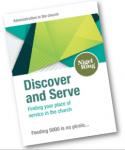I have just returned from Guinea and will report on that more fully in due course. While there I was able to teach from this Discover and Serve material which I have now published as a book. I was very encouraged by the response.
 The book includes all the teaching I have been giving in recent months as well as several appendices to help you implement the course in your church. The cost is £5.99 + postage. 10% discount on 10 or more copies. Please order through feeding5000isnopicnic@gmail.com in the side panel with Book Order in the subject line.
The book includes all the teaching I have been giving in recent months as well as several appendices to help you implement the course in your church. The cost is £5.99 + postage. 10% discount on 10 or more copies. Please order through feeding5000isnopicnic@gmail.com in the side panel with Book Order in the subject line.
Now to continue the series with a consideration of Time.
The concept of time
 We live in a frenetic world, particularly in the ‘west’/northern hemisphere. Every day is often filled to the limit, leaving very little room for reflection and relationships. However, in many cultures time is seen as being primarily for people, an excellent value system in my opinion! They seem less rushed to fit too much into a day.
We live in a frenetic world, particularly in the ‘west’/northern hemisphere. Every day is often filled to the limit, leaving very little room for reflection and relationships. However, in many cultures time is seen as being primarily for people, an excellent value system in my opinion! They seem less rushed to fit too much into a day.
The Bible has some interesting reflections on time and how we use it. Here are a few relevant scriptures.
‘Teach us to number our days.. 70-80 years’ (Psalms 90:12 )
‘Let the favour of the Lord our God be upon us, and establish the work of our hands upon us’ (Psalms 90:17 )
‘Commit your work to the LORD, and your plans will be established’ (Proverbs 16:3)
‘The heart of man plans his way, but the Lord establishes his steps’ (Proverbs 16:9)
‘Look carefully how you walk …making the best use of the time…’ (Ephesians 5:15-16 )
‘..we are created … for good works … that we should walk in them’ (Ephesians 2:10 )
Also, Jesus gave a victory cry ‘It is finished’ (John 19:30 ) referring to the accomplishment of the purpose for which he came to live on earth.
How does this affect our serving?
The church can consume a great deal of our time and I know, from personal experience, that it is easy to get the balance wrong on occasion, putting church ahead of family-time for instance.
When creating a Serving Profile for someone there are some important factors that need to be considered such as:
1. What stage in life is this person at?
A student must not neglect his or her studies; Newly weds must give time to develop their relationship; Parents must not ‘short change’ their children, and so on. Some people must be protected from over-commitment to church activities – that does not honour God.
2. Do they have some time regularly available?
A businessman who works away from home clearly cannot give evenings to serve in the church. So, why not focus on a once-per-month rota to support the Sunday meeting?
Many tasks in the church are carried out on a rota basis so it is worth being aware of these opportunities, whether weekly or monthly. Some of these will focus on a particular day (often Sunday) while others may be related to a weekday ministry, such as the need to follow up Sunday visitors on a Monday.
3. Do they have chunks of time on occasion?
A teacher may have very little time during term time but in the school holidays he may be relatively available. So it is better to focus such a person’s time on mini projects during those times. This could be running a children’s holiday club, organising an outing for older people, or similar.
It is important not to urge someone into involvement when that causes unwarranted pressure in some other part of their lives. And they must have the liberty to say ‘no’ without feeling condemned or a failure.
Next time we shall consider Spiritual Maturity
